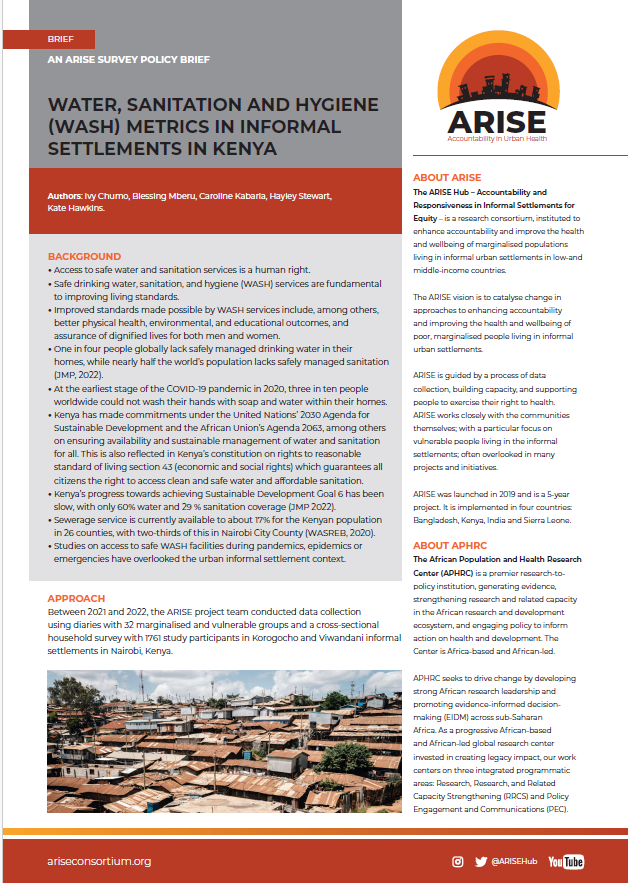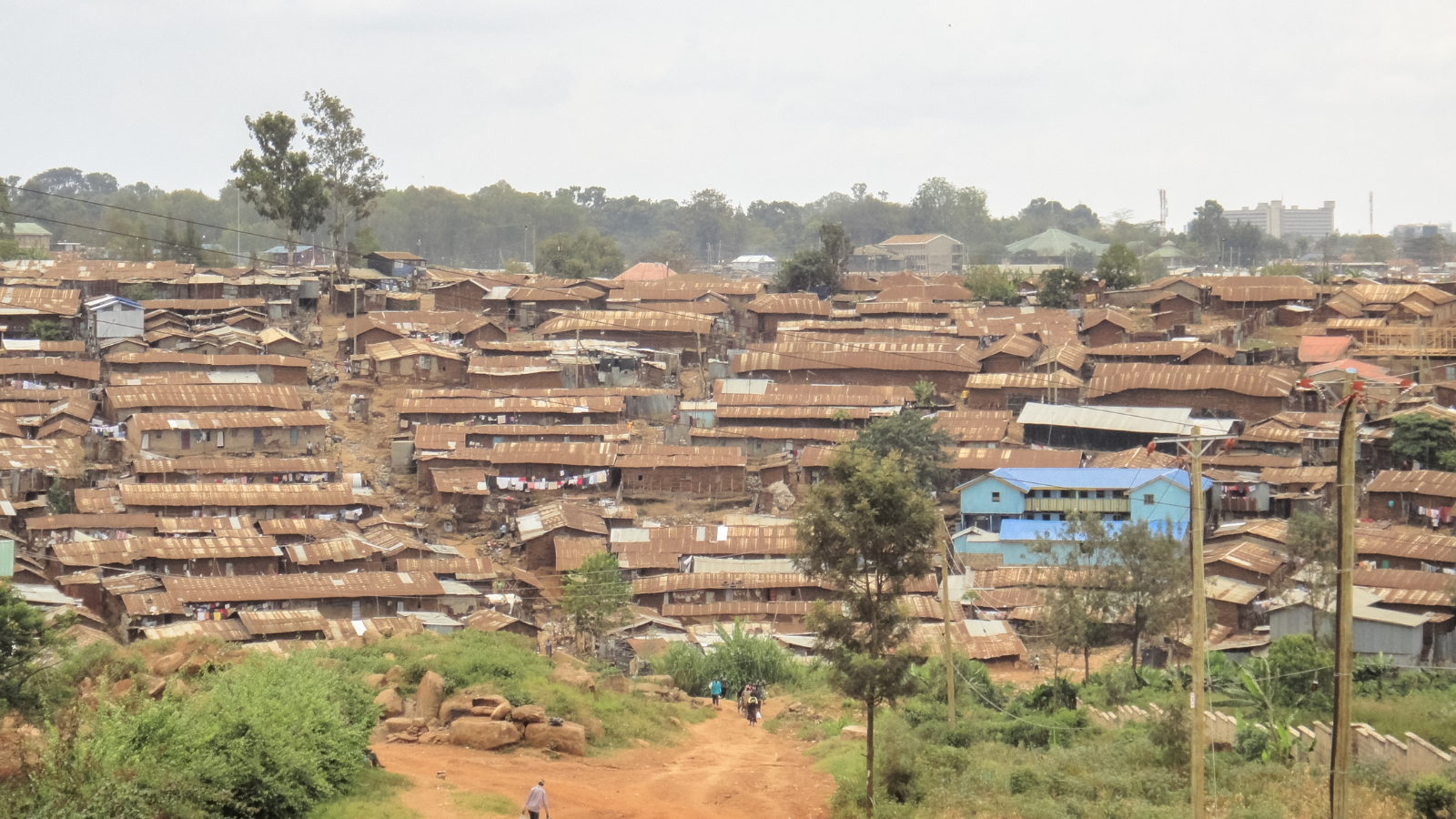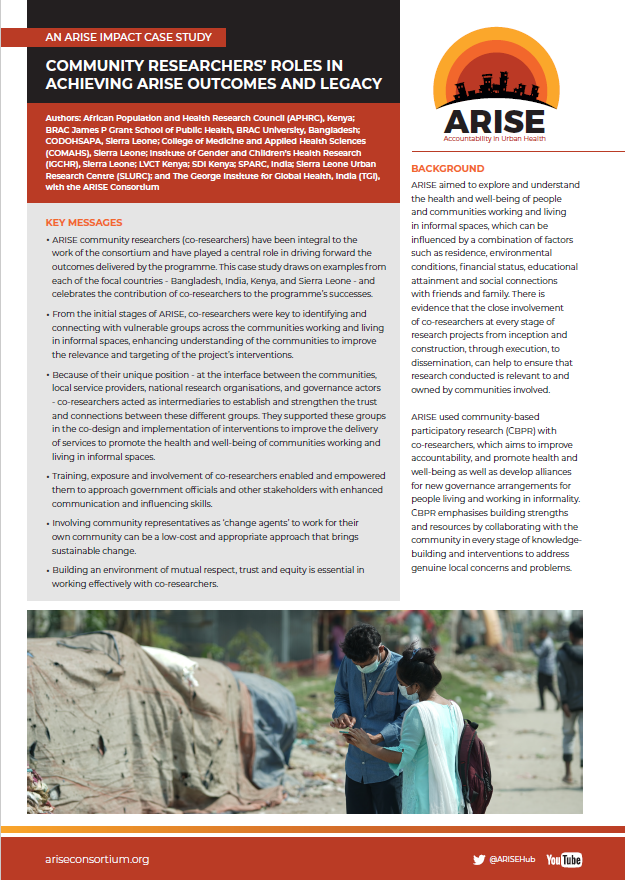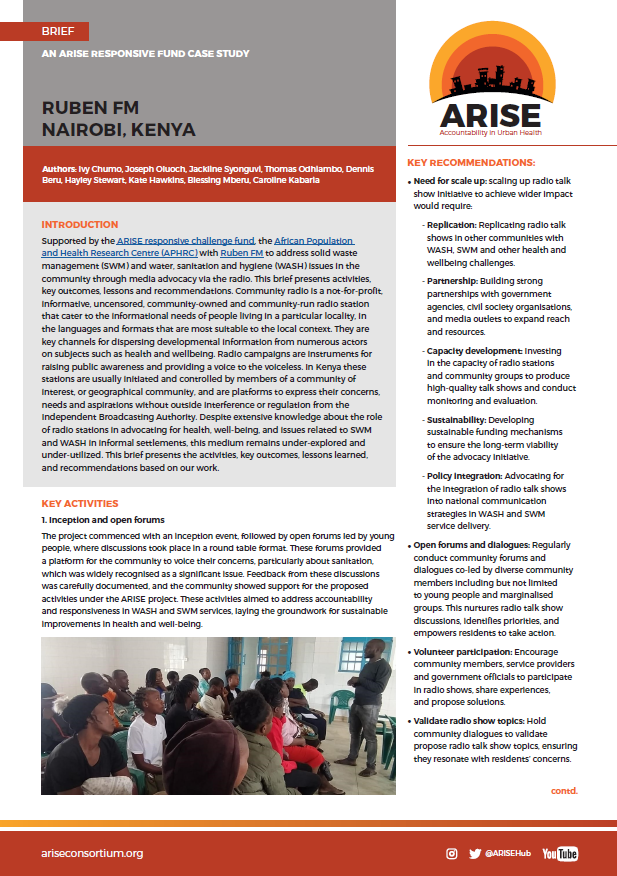Kenya
Nairobi symbolises sub-Saharan Africa’s rapid urbanisation and population growth. Informal urban settlements have spread: home to an estimated 60-70% of Nairobi’s residents. The population of informal settlements in Nairobi is highly migratory and transient. Meeting the increasing demands of this new population is a huge challenge for policymakers.
Health and social issues
There is a substantial amount of information about health within Nairobi’s informal settlements, due to surveys in 2000 and 2012. Regular surveys of informal settlements are also undertaken by Muungano wa Wanavijiji (SDI affiliated slum dweller federation) in support of community organizing, the production of grassroots knowledge, and to serve as an anchor for bottom up planning and authentic partnerships between the poor and local government. Despite improvements in some environmental, health and educational indicators among residents, these are not uniform, and are worse among groups of younger women and women without formal education. Lack of drinking water and poor drainage were most commonly identified as priority needs by residents in the 2012 survey. Other concerns include housing, access to education, rubbish/sewer disposal and security. Childhood mortality in informal urban settlements was almost halved between 2000 and 2012. However, progress was not even, with girls faring worse than boys.
Data suggests greater social fluidity and vulnerability in informal settlements than elsewhere in Nairobi and Kenya. Between 2000 and 2012 the proportion of young people with secondary or higher education rose between 2000 and 2012 and the gap in educational attainment between male and female school-age residents narrowed. And yet, people living in informal urban settlements continue to be at a disadvantage compared to their counterparts elsewhere in Nairobi.
Unemployment remained a major issue among residents, and the unemployment rate among women aged 20-24 is particularly high. High illiteracy rates among women aged 44-49 attest to the vulnerability of this age group. Contraceptive use and knowledge among young (aged 15-19), unmarried, sexually active women remain low and both young women and men are likely to have more sexual partners than in the rest of Kenya.
Although the proportion of young people reporting alcohol and drug use fell between 2000 and 2012, the level of alcohol and drug use among orphaned young males was high, indicating the vulnerability of this group.
Crime is a significant problem in informal urban settlements in Kenya. A study by Security Research and Information Center, found that 98.8% of respondents in a crime survey had witnessed crime being committed in the last three months of the study period. According to research by LVCT Health, girls as young as 11 or 12 are vulnerable to sexual exploitation and abuse as a result of social and family fragmentation, limited access to education, gender-based violence, parental alcohol and drug dependence, food and accommodation insecurity and livelihood stress.
Governance
Widespread community organisation by people living in informal settlements dates back to the mid–1990s, with the emergence of Muungano wa Wanavijiji (known as Muungano), a social movement of ‘slum’ residents and urban poor people in Kenya. Muungano joined the global SDI network in 2001. Muungano brings thousands of women-led savings groups together into a slum dweller federation that is driven and governed by members committed to organising the urban poor, profiling and mapping slums, and using their savings and their knowledge to plan and implement slum upgrading and improve lives for residents of slum settlements. The movement was formed as a response to widespread informal settlement evictions which continue to plague communities in Nairobi. The network has made visible the inequities and health vulnerabilities experienced by residents, for instance, the city’s poorest people in informal settlements pay far more for lower-quality water, sanitation and electricity than households elsewhere in the city, constituting a crippling poverty penalty that the federation seeks to unlock in projects such as the Mukuru SPA. It has also demonstrated people’s capacity to improve their environment and realize their right to health through negotiation with government, partnerships and action. Muungano’s work shows that slum upgrading is one of the most effective strategies for improving health in informal settlements. As part of the SDI network, Muungano and other slum, dweller federations share tools and “rituals” such as community savings, community led profiling and mapping of slums, partnership with government for the co-production of upgrading, land and housing strategies, as well as peer-to-peer exchange between federations.
In 2000 the first formal survey of the conditions of residents in informal urban settlements in Nairobi, conducted by APHRC, contributed to the increasing visibility to policymakers. In response to this activism and evidence, a number of projects have sought to improve the quality of life. Projects include ‘slum upgrading’, maternity care, non-formal education, sanitation in schools, housing and HIV prevention and treatment. In August 2017, the Kenya Gazette, the government’s official journal, declared an area of 550 acres (the area occupied by the Mukuru slums) to be a Special Planning Area (SPA). Usually, informal urban settlement interventions in Kenya are driven by international development agencies that then draw in city governments. In contrast, the Mukuru SPA is a project of the Nairobi city government. The SPA’s goal is to develop a plan that is incorporated into the city’s own 20-year vision. The approach includes all departments of the county, as well as consortia of civil society and development organisations. This has created a new narrative: one in which the improvement of informal settlements is a challenge for the whole city. The SPA has used research – including data collected and analysed by residents themselves – to frame the problem of informal urban settlements in a way that says, “Together we can.”
Devolution in Kenya has shifted decision making to the County level and created a set of powerful new governance actors. It has also brought some resources and development to the local level. There have been investments in slum upgrading by the Kenyan government and partners, however multiple challenges remain.
Read more
African Population and Health Research Center (APHRC). 2014. Population and Health Dynamics in Nairobi’s Informal Settlements: Report of the Nairobi Cross-sectional Slums Survey (NCSS) 2012. Nairobi: APHRC.
Jack Makau and Jane Weru (2018) Would We Know Scale If She Walked By? Revolutionary Planning in Mukuru, Nairobi, in Know Your City: Slum Dwellers Count (SDI, Cape Town, 2018, pages 23 – 27).
Nduta S. and Mukoma W. 2011. Lost Innocence: Stories of children exploited through sex work in Korogocho, Nairobi. Liverpool VCT, Care & Treatment.
Posts on Kenya

Water, sanitation and hygiene (WASH) metrics in informal settlements in Kenya
Between 2021 and 2022, the ARISE project team conducted data collection using diaries with 32 marginalised and vulnerable groups and a cross-sectional household survey with 1761 study participants in Korogocho and Viwandani informal settlements in Nairobi, Kenya. This brief outlines the findings from this survey. .

The value of community capitals in sustainable urban development: A qualitative exploration of urban informal workers
Urban informality, often viewed negatively, is not solely the product of the urban poor but also reflects the failure of formal systems to adapt. Informal workers, who make up about 61% of the global workforce, operate outside formal labor laws and significantly contribute to urban development. Understanding and harnessing community capitals are vital for sustainable […]

Impact Case Study: Community researchers’ roles in achieving ARISE outcomes and legacy
ARISE aimed to explore and understand the health and well-being of people and communities working and living in informal spaces, which can be influenced by a combination of factors such as residence, environmental conditions, financial status, educational attainment and social connections with friends and family. There is evidence that the close involvement of co-researchers at […]

Brief: Working with Ruben FM to address SWM and WASH issues in Nairobi through community radio
Supported by the ARISE responsive challenge fund, the African Population and Health Research Centre (APHRC) worked with Ruben FM to address solid waste management (SWM) and water, sanitation and hygiene (WASH) issues in the community through media advocacy via the radio. This brief presents activities, key outcomes, lessons and recommendations. Community radio is a not-for-profit, […]